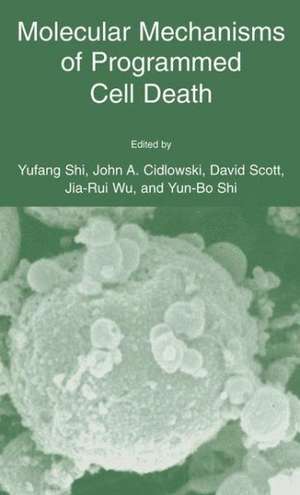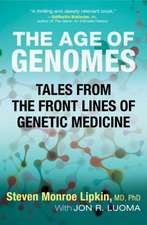Molecular Mechanisms of Programmed Cell Death
Editat de Yufang Shi, John A. Cidlowski, David W. Scott, Jia-Rui Wu, Yun Bo Shien Limba Engleză Paperback – 5 dec 2010
| Toate formatele și edițiile | Preț | Express |
|---|---|---|
| Paperback (1) | 979.42 lei 38-44 zile | |
| Springer Us – 5 dec 2010 | 979.42 lei 38-44 zile | |
| Hardback (1) | 1000.02 lei 38-44 zile | |
| Springer Us – 30 dec 2003 | 1000.02 lei 38-44 zile |
Preț: 979.42 lei
Preț vechi: 1030.96 lei
-5% Nou
Puncte Express: 1469
Preț estimativ în valută:
187.41€ • 196.20$ • 155.07£
187.41€ • 196.20$ • 155.07£
Carte tipărită la comandă
Livrare economică 02-08 aprilie
Preluare comenzi: 021 569.72.76
Specificații
ISBN-13: 9781441934048
ISBN-10: 1441934049
Pagini: 244
Ilustrații: X, 229 p. 26 illus.
Dimensiuni: 170 x 244 x 13 mm
Greutate: 0 kg
Ediția:Softcover reprint of hardcover 1st ed. 2003
Editura: Springer Us
Colecția Springer
Locul publicării:New York, NY, United States
ISBN-10: 1441934049
Pagini: 244
Ilustrații: X, 229 p. 26 illus.
Dimensiuni: 170 x 244 x 13 mm
Greutate: 0 kg
Ediția:Softcover reprint of hardcover 1st ed. 2003
Editura: Springer Us
Colecția Springer
Locul publicării:New York, NY, United States
Public țintă
ResearchDescriere
The 2002 Nobel Prize in Physiology or Medicine was awarded to Sydney Brenner, H. Robert Horvitz, and John E. Sulston for their seminal discoveries concerning "genetic regulation of organ development and programmed cell death." This clearly marked the prime importance of understanding the molecular mechanisms controlling cell death. The 1 st International Symposium on Programmed Cell Death was held in the Shanghai Science Center of the Chinese Academy of Sciences on September 8-12, 1996. A number of key issues in apoptosis were discussed at the meeting, and progress in major areas of apopto sis research was summarized by expert participants at the meeting and published by Plenum Publishing Corporation as a book entitled Programmed Cell Death. In the last six years, we have witnessed a real explosion in our knowledge on how cells undergo apoptosis, thereby participating in various developmental and pathophysiological processes. At this ever exciting time, we organized the 2nd International Symposium on Programmed Cell Death.
Cuprins
1. Akt and Bcl-xL Are Independent Regulators of the Mitochondrial Cell Death Pathways.- 2. Thyroid Hormone-Induced Apoptosis during Amphibian Metamorphosis.- 3. The Endoplasmic Reticulum Stress Response in Health and Disease.- 4. The Role of the PI3K Pathway in Anti-IgM (Anti-?) -Sensitive and -Resistant B-cell Lymphomas: Failure to Disengage PI3K Pathway Signaling Confers Anti-? Resistance on the CH12 B Cell Lymphoma.- 5. Signaling for Inducible Fas-Resistance in Primary B Lymphocytes.- 6. Apoptosis and Autoimmune Diseases.- 7. Oxidative Stress and Thymocyte Apoptosis.- 8. Activation-Induced Cell Death and T Helper Subset Differentiation.- 9. The Bax-/- Bak-/- Mouse: a Model for Apoptosis.- 10. Novel Transcriptional Regulatory Pathways of IL-3-Dependent Survival Responses.- 11. MAP-1 Is a Putative Ligand for the Multidomain Proapoptotic Protein Bax.- 12. The Mechanisms and Significance of Apoptotic Cell-Mediated Immune Regulation.- 13. Neuroprotection against Apoptosis: What Has it Got to Do with the Mood Stabilizer Lithium?.- 14. Apoptosis, Cancer, and Cancer Therapy.- 15. DNA Fragmentation in Mammalian Apoptosis and Tissue Homeostasis.- 16. Ubiquitin and Intracellular Aggregation: A Common Pathway of Neurodegeneration in Chronic Dementia?.- 17. The Mechanism of Apoptosis Regulation by IAP Antagonist Smac/DIABLO.- 18. Integration of TNF-? Signaling: Crosstalk between IKK, JNK, and Caspases.















